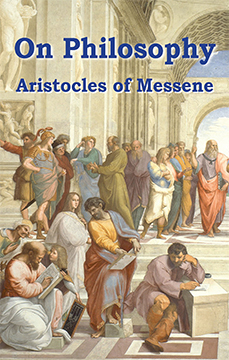
On Philosophyby Aristocles of Messene
new material in this edition copyright © 2014, 2019
Read a selection from the bookBuy or preview the book on amazon.comOutside the US, search for this |
The Most Important Classical Survey of Epistemology
For the first time, this book makes the surviving fragments of Ariscocles’ On Philosophy available in a low-cost edition aimed at readers who are interested in the book as philosophy.
Ariscocles was a peripatetic philosopher who lived in the First Century AD. Extensive fragments about epistemology survive from his writing, and they can change our thinking about the history of philosophy.
Most people who have studied philosophy would agree that there was what Ortega y Gasset called a “turn to the subjective” in the seventeenth century. Philosophers before this time focused on understanding the world, while philosophers after this time focused on understanding our ability to know the world.
Aristocles’ writing shows us that, in reality, many classical philosophies also focused on our ability to know the world.
These classical philosophies anticipate many of the issues that have preoccupied modern philosophers, and they can give us a new perspective on these issues.
On Philosophy
Reconstructing Aristocles' Book
All the fragments of Aristocles’ writing that survive are in Eusebius’s Praeparatio Evangelica, which contains many passages from classical philosophers. Eusebius’ goal was to defend Christianity, so he tends to quote passages where classical philosophers refute other classical philosophers, rather than those where they advocate their own positions. As a result, we have Aristocles’ lengthy criticisms of other epistemologies, but we just have tantalizing hints of his own epistemology.
Eusebius tells us that the passages he quotes are from Books Seven and Eight of Aristocles’ On Philosophy, which had a total of ten books. The fragments from Book Seven discuss a few philosophers generally, and they are so short that we cannot see whether they have a more specific focus. The fragments from Book Eight are longer and focus very clearly on epistemology.
It is possible to imagine what the entire work was like. Asclepius of Tralles and Johannes Philoponus, both writing in the sixth century, give us a hint when they say that Aristocles believed there were five types of wisdom. After the flood that destroyed the world in Greek mythology, the survivors first learned how to produce food, which is the wisdom acquired at the time of necessity. Second, they learned carpentry, architecture, and other arts, which is wisdom in arts. Third, they made laws, which is wisdom in political matters. Fourth, they studied physics. Fifth, they studied divine and eternal things. Both these writers tell us that Aristocles says in On Philosophy that the words “wisdom” and “wise” are understood in these five ways.
It seems, then, that Aristocles used the word “philosophy” to refer generally to love of wisdom, the literal meaning of the word in Greek, and that the book On Philosophy was a sort of historical survey of all knowledge, beginning with the most basic form of knowledge, how to produce food, and ending with the most exalted form of knowledge, theology.
The Suda, a tenth-century encyclopedia, tells us that Aristocles wrote two works about philosophers and their opinions, On Philosophy in ten books and Whether Homer or Plato is the Better. The fact that Aristocles compared Homer and Plato in a book that the Suda says is about philosophers confirms that he used the word “philosophy” in a broader sense than we do today.
Thus, the first six books of On Philosophy were probably about the earlier types of knowledge that Asclepius and Philoponus list, the knowledge of food production, crafts, and politics. The Suda confirms this speculation in an oblique way, when it says that Book Six of On Philosophy mentions Sotadas of Byzantium, an almost unknown philosopher who (Clement of Alexandria tells us) dealt with the sayings of the Seven Sages. Since many early legislators, such as Solon, were included among the Seven Sages, this confirms the idea that Book Six was about politics.
If the first six books were about the first three types of knowledge, and all ten books are about the five types of knowldge, it seems plausible that On Philosophy devoted two books to each type of knowledge. The problem is that the fourth and fifth types are knowledge of physics and of divine things, while the fragments we have from Books Seven are background descriptions of philosophers and the fragments from Book Eight are about epistemology.
In ancient Greek, physics simply meant the study of nature. It is plausible that Books Seven through Ten were about what we would call classical philosophy, with Books Seven and Eight covering what the philosophers said about nature and Books Nine and Ten covering what the philosophers (and perhaps others) said about theology.
Then the fragments with general material about philosophers would be from the beginning of Book Seven, where Aristocles introduced the philosophers whose ideas he covered in Books Seven through Ten. The fragments from Book Eight about epistemology do not fit under any of Aristocles' five categories of wisdom, and the only plausible explanation of why they are included is that epistemology was considered part of the philosophers' study of nature.
Thus, we can guess that On Philosophy was meant to be a summary of all knowledge. The five types of knowledge (agriculture, crafts, politics, study of nature, and study of the divine) were covered in ten books, with two books devoted to each. The final four books covered the two subjects that the people we consider classical philosophers wrote about, study of nature and of the divine. And epistemology was considered part of the philosophers' study of nature.


